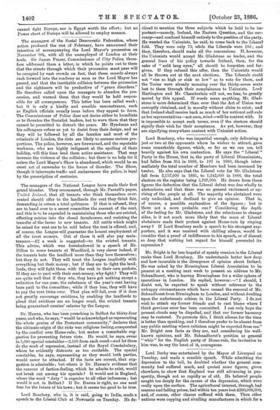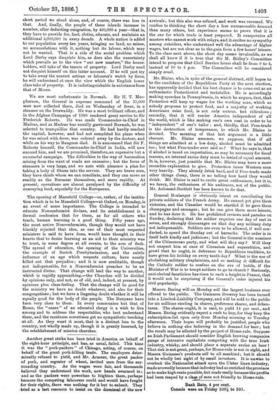Lord Derby was entertained by the Mayor of Liverpool on
Tuesday, and made a sensible speech. While admitting the depression to the full, he doubted whether the general com- munity had suffered much, and quoted some figures, given elsewhere, to show that England was still advancing in pro- sperity, though not so rapidly as of old. He believed people sought too deeply for the causes of the depression, which were really upon the surface. The agricultural interest, through bad seasons and falling prices, had within ten years lost £200,000,000, and, of coarse, other classes suffered with them. Then other nations were copying and rivalling manufactures in which for a.
short period we stood alone, and, of course, there was loss in that. And, finally, the people of these islands increase in number, after deducting emigration, by 400,000 a year—that is, they have to provide for, feed, clothe, educate, and maintain an additional 4,000,000 in every decade. A whole nation is added to our population every ten years, bringing no land, no mines, no accumulations with it, nothing but its labour, which may not be wanted. That is a side of the social problem which Lord Derby says disquiets him, as does also the uncertainty which prevails as to the view " our new masters," the house- holders, will take of the tenure of property. Lord Derby need not disquiet himself on this latter account. If he will just try to take away the nearest artisan or labourer's watch by force, he will understand at once the view which the English lower class take of property. It is indistinguishable in substance from that of Moses.



































 Previous page
Previous page